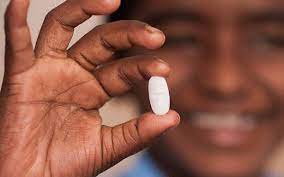The Ghana Health Service (GHS) has begun the 2023 National School and Community Mass Drug Administration exercise to deworm some 3.2 million school-aged children across the country.
The exercise, which began on Monday, November 13, 2023, aims to eliminate Schistosomiasis and Transmitted Helminth infestations that have become endermic in many parts of the country.
It is expected to end on November 17, 2023. Children in 15,573 schools in 116 districts across 15 regions, except for the North East region, are targeted in the exercise.
The exercise is on the theme “Achieving Health Equity to Eliminate Schistosomiasis and Soil-Transmitted Helminth Infection.”
It is a collaboration between the GHS and the Ghana Education Service (GES).
Dr Anthony Adofo Ofosu, the Deputy Director-General of the Ghana Health Service, said the exercise was important because, in addition to school-aged children being the most vulnerable age group for parasitic infections, it is the most cost-effective way of delivering regular deworming medicines for children on a large scale.
He stated that the exercise’s theme was pertinent to the country’s present challenges in enhancing healthcare access for underprivileged communities.
Schistosomiasis is a parasitic worm infestation affecting almost one million people in Ghana, with the highest prevalence in areas around larger water bodies.
Deworming is the administration of anthelmintic medicines to eligible populations to eliminate helminth parasites such as tape and roundworms, schistosomes, among others.
The World Health Organization (WHO) estimates that over 1.5 billion people, or nearly one in four of the world’s population, are infected globally with intestinal worms with over 880 million school-aged children in need of treatment.
These infections were contracted through infested water bodies or soil contaminated with feacal matter, resulting in schistosomiasis or soil helminthiasis infection, and have a high prevalence in school-age children aged 5 to 14 years.
Dr Franklyn Asiedu-Bekoe, the Director, Public Health Division, GHS said that Praziquantel (600mg) and Albendazole (400mg) dosage would be administered to each child based on height under the close supervision of teachers and health workers.
“These medicines will be administered under strict supervision of teachers to the school-age children at their respective schools with assistance from local health workers.
“Preferably, medicines should be administered immediately after the first lunch break or after children have been served with food by the feeding programme to give the assurance that all children have eaten,” he said.
Dr Asiedu-Bekoe called on parents, guardians, and caregivers to ensure their children eat before going to school.
He also urged schools, both public and private, and parents, regardless of social level, gender, or religion, to cooperate, collaborate, and support the deworming initiative in the targeted districts and schools to improve coverage and rid Ghana of parasitic infections.
He assured that the drugs were safe for use and had little to no discomforts.
Latest Stories
-
Ice cubes now cost more than bread and milk in parts of Mali
1 hour -
Titanic gold pocket watch sells for £900,000
2 hours -
Elon Musk in China to discuss enabling full self driving – reports
2 hours -
Foreign Affairs Ministry advises against travelling to Northern Mali
2 hours -
After dating him for three years, I proposed to my husband
2 hours -
Beatrice ‘Bee’ Arthur tackles plastic pollution through artistic exploration
3 hours -
Hundreds turn out for Luv FM/Telecel Fitness Walk in Kumasi
3 hours -
Ghana Post launches Asantehene Commemorative Stamp
3 hours -
Police fire tear gas to disperse Benin wage protest
3 hours -
Airline keeps mistaking 101-year-old woman for baby
3 hours -
Harvey Weinstein hospitalised after conviction overturned
3 hours -
Anis Hafar: Learning how to avoid wars
4 hours -
Private legal practitioner wins Akan NPP parliamentary candidate poll
4 hours -
American-Israeli hostage appears in Hamas video for first time
4 hours -
‘Who were the successful bidders of 10 BVDs, how was auction advertised?’ – Imani quizzes EC
4 hours

